- Url
Share
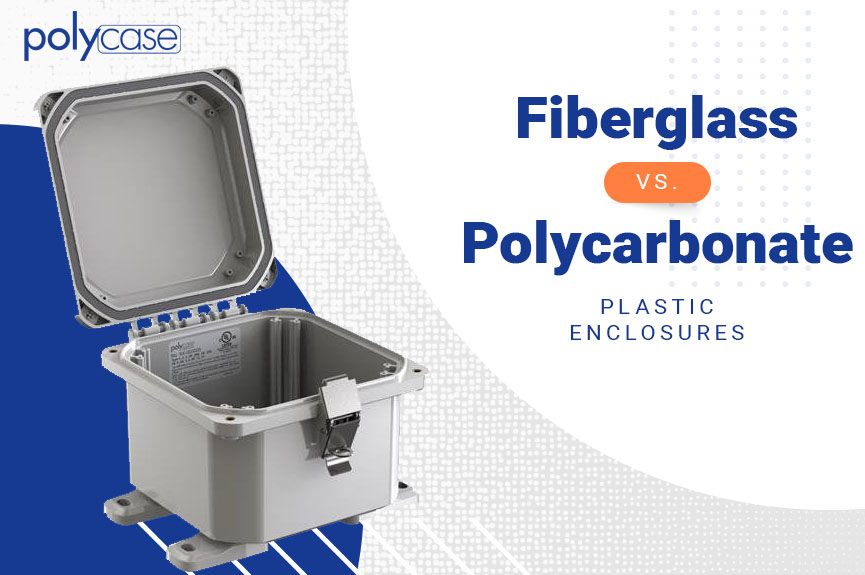
Fiberglass and polycarbonate plastic are two of the most common materials for non-metallic electrical enclosures. Device designers frequently specify enclosures made from these materials when they need corrosion-resistant, outdoor-grade enclosures for electrical and electronic equipment. However, the two materials are hardly interchangeable — so it’s crucial to know the difference between them before making your choice.
Up ahead, we’ll compare the major differences in polycarbonate plastic vs. fiberglass electrical boxes and talk about why they’re important. From resistance to weather conditions to ability to withstand impacts, these are the factors that will determine how well an enclosure protects a device. To start, here is a basic guide to what these two materials are made of and what they’re used for.
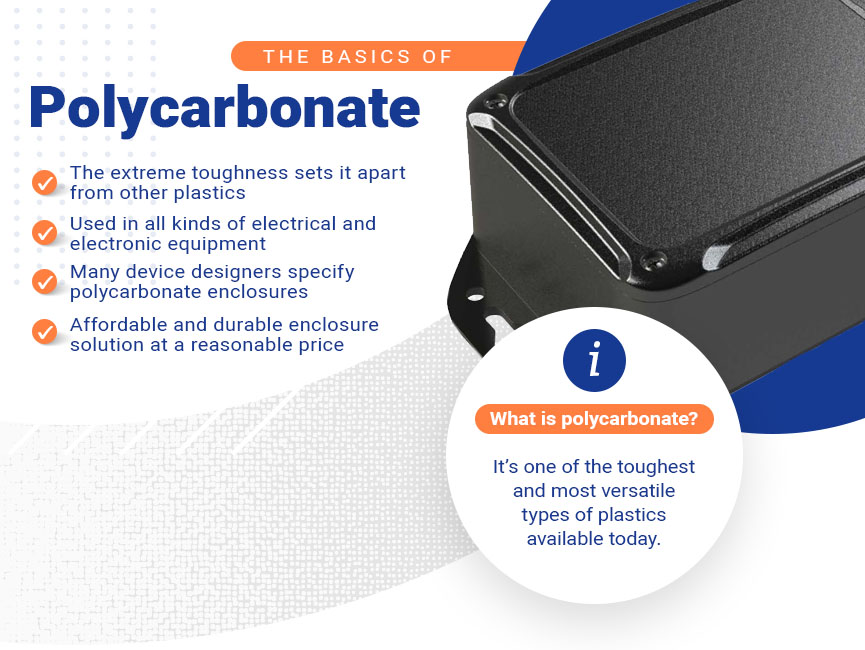
The Basics of Polycarbonate
Let’s start with a basic question: What is polycarbonate? It’s one of the toughest and most versatile types of plastics available today. The word “polycarbonate” actually refers to a group of thermoplastic polymers that share certain characteristics based on the presence of carbonate groups in their molecular structures. These characteristics include durability and the ability to be molded into many forms, as well as the capacity to be melted down and recycled into new structures.
The extreme toughness and adaptability of polycarbonate sets it apart from other common types of plastics. Other plastics may match or exceed polycarbonate in some performance areas, but none offer the complete package of attributes while remaining competitively priced. Even ABS enclosures, another common type of plastic electronics enclosures that are excellent for indoor applications, can’t match the durability of polycarbonate in outdoor performance. (See our guide to ABS vs. polycarbonate for more on the differences between these two materials!)
You’ll find polycarbonate used in all kinds of electrical and electronic equipment, especially in applications where devices need protection from harsh conditions. It’s also common in non-industrial applications, from building skylights to safety helmets to the lenses in eyeglasses. When it comes to electronics enclosures, many device designers specify polycarbonate enclosures because they provide an affordable and durable enclosure solution at a reasonable price.
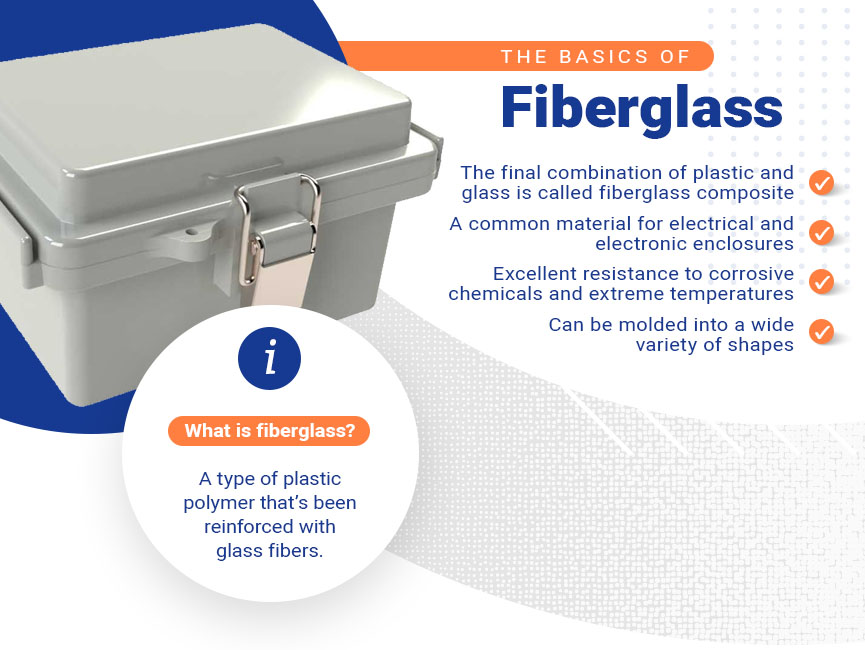
The Basics of Fiberglass
Fiberglass is another material that’s everywhere in the modern world. In the context of enclosures, it refers to a type of plastic polymer that’s been reinforced with glass fibers. Technically, the final combination of plastic and glass is called fiberglass composite or fiberglass reinforced polymer (FRP), but “fiberglass” is the most common term.
Today, fiberglass is a crucial material for numerous industries, including auto manufacturing, aircraft parts, swimming pools and building materials. As previously noted, it’s also a common material for electrical and electronic enclosures. In its non-composite forms, fiberglass is also used for products such as home insulation.
Engineers and manufacturers prize fiberglass for many of its qualities, including its excellent resistance to corrosive chemicals and extreme temperatures. In addition, fiberglass can be molded into a wide variety of shapes and receive many different finishes.
Polycarbonate Plastic vs. Fiberglass Electrical Boxes: Comparing the Properties
Now it’s time for a head-to-head comparison of how fiberglass and polycarbonate enclosures stack up. We’ll compare them on several key categories that can determine their suitability for your non-metallic enclosure application.
What Polycarbonate and Fiberglass Have in Common
Polycarbonate and fiberglass enclosures share some characteristics, including:
- Outdoor-Grade: Polycarbonate and fiberglass both offer a level of basic toughness and moisture resistance that makes them suitable for either indoor or outdoor enclosures. (That doesn’t mean that they’re equally durable in all respects, however.)
- Non-Conductive: Like all non-metallic enclosure materials, polycarbonate and fiberglass are both electrical insulators. In some applications, that’s a plus for electrical safety because it means the enclosure cannot become energized with electricity.
- Heat Insulating: Both of these materials conduct heat very slowly, so they can help protect devices from hot or cold conditions outside the enclosure by insulating them. Consequently, however, both enclosure types can have problems dissipating excessive heat buildup without the use of enclosure vents or fans.
- Thermal Resistance: Polycarbonate and fiberglass can both tolerate a wide range of ambient temperatures. Polycase’s polycarbonate enclosures have a working temperature range of -40ºC to 120ºC (-40ºF to to 248ºF), while most fiberglass enclosures can tolerate around -35ºC to 148ºC (-31ºF to 300ºF).
- RF Permeable: Radio frequency waves pass through fiberglass and polycarbonate with equal ease. Thus, either material can be a good choice for an outdoor communications device enclosure that needs to transmit and receive wireless signals. On the other hand, this means non-metallic enclosures also don’t naturally protect devices from electromagnetic interference in the way that metal enclosures do.
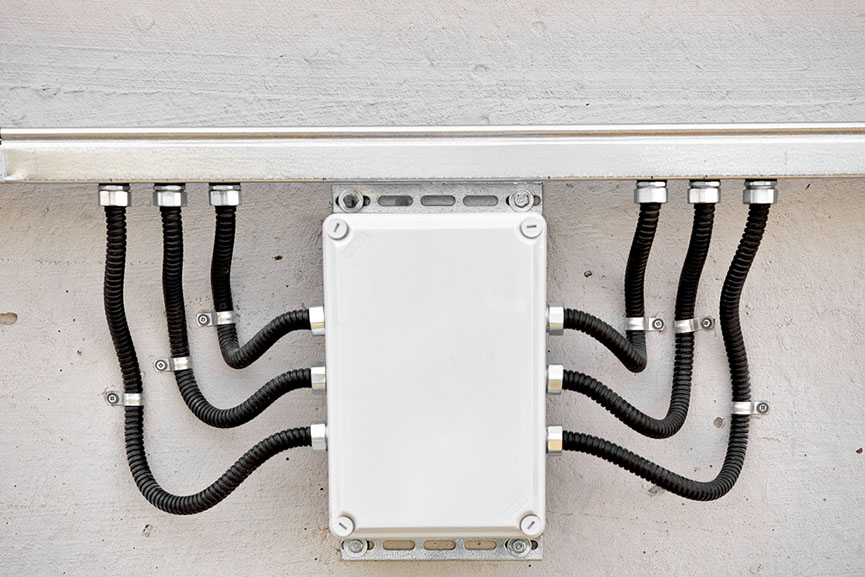
Impact Resistance
Although both polycarbonate and fiberglass are highly resistant to impacts, polycarbonate’s impact resistance is truly exceptional. It’s so good, in fact, that polycarbonate is a standard choice for applications such as bulletproof teller windows in banks and safety barriers in hockey arenas.
Because polycarbonate is among the most impact-resistant enclosure materials on the market today, it’s an excellent choice for outdoor electronics enclosures or industrial enclosures. If impact resistance is a top concern, polycarbonate electronics enclosures may even be a better choice than metal enclosures, which can be vulnerable to denting.
UV Resistance
Prolonged UV exposure can be an issue for fiberglass. When fiberglass sits in a sun-exposed area for long periods of time, a phenomenon called fiber bloom can affect it.
Fiber bloom happens when UV light causes the glass fibers inside a fiberglass composite to become exposed just beneath the surface. Although fiber bloom generally doesn’t affect structural integrity, its resulting texture is often uncomfortable to handle. The textured surface also becomes more vulnerable to accumulating grime and grease, which can potentially create a conductive path under extreme circumstances.
Fortunately, UV resistant polycarbonate is widely available. All of Polycase’s polycarbonate enclosures are made with this superior UV resistant grade of polycarbonate to ensure that our electrical boxes handle the sun just as well as they do rain and snow.
Transparency
Polycarbonate is naturally transparent, which is why it’s common to find clear polycarbonate enclosures. This feature can be a big time- and effort-saver, since workers will no longer have to open a device’s enclosure to read relevant data. Gas and electric utility meters, for example, use transparent polycarbonate covers so that meter readers can easily record data without the need to open the enclosure.
Polycase’s lineup of polycarbonate enclosures includes several enclosure models with clear covers. Fiberglass enclosures may be available with transparent windows, but these windows are usually made from polycarbonate.
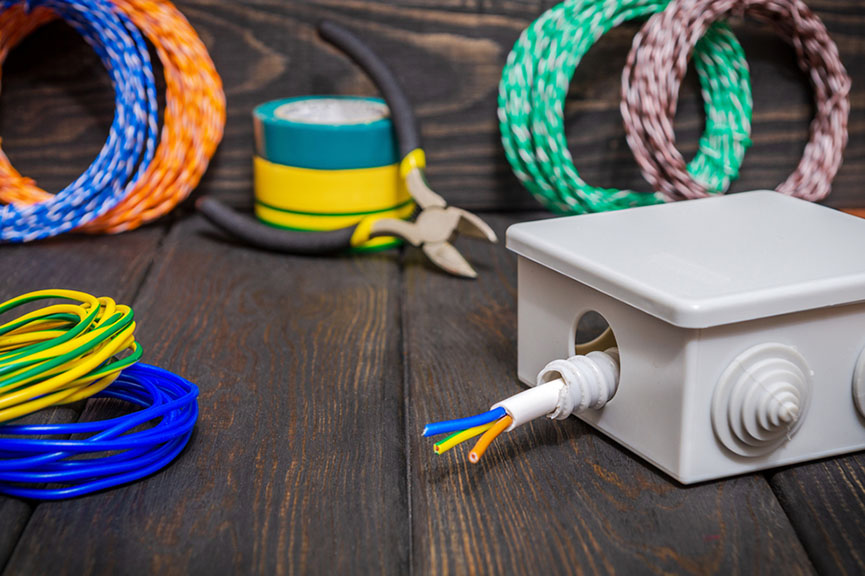
Corrosion and Chemical Resistance
Both fiberglass and polycarbonate can be good choices for corrosive environments. Corrosion-resistant NEMA 4X polycarbonate enclosures are among Polycase’s most popular choices for marine environments and for environments that involve exposure to mildly corrosive liquids. Polycarbonate is naturally resistant to corrosion from many types of acids and also handles substances like oil and grease well.
However, one of polycarbonate’s only downsides is that it can be vulnerable to strong basic substances and organic solvents. Polycarbonate enclosures are not recommended for applications where the enclosure might be exposed to chemicals such as ammonia or acetone. Fiberglass enclosures do offer better performance than polycarbonate against these chemicals. However, metal enclosures like stainless steel and aluminum enclosures can also be a good choice for those who need chemical resistance.
Ease of Customization
Fiberglass is notoriously difficult to cut with standard tools. Without tools and techniques specifically designed for fiberglass, its numerous layers of tiny fibers make it prone to splintered, ragged cuts. Cutting fiberglass can dull or otherwise damage the blades and bits of tools, and workers need to wear eye and respiratory PPE during the cutting process due to the large amounts of tiny glass fibers that it disperses into the air.
Polycarbonate, by contrast, is easy to machine into almost any form you need. In fact, Polycase offers extensive customization options for all of our polycarbonate enclosures, including ultra-precise CNC machining for the most precise and accurate cutouts. We can outfit your polycarbonate enclosure with cutouts, vents, threaded holes or almost anything else you need!
Cost
Generally, polycarbonate is the most affordable outdoor enclosure material available. (ABS enclosures come at a lower price point, but aren’t suitable for outdoor use.) While it’s true that fiberglass enclosures are still less expensive than steel or aluminum enclosures, polycarbonate beats all three on affordability almost every time.
At Polycase, we also take extra steps to ensure that every customer gets the best possible value from our enclosures. That’s why we also offer our in-house enclosure customization with digital printing and CNC machining, as well as a huge variety of enclosure accessories to get your box outfitted just right. By making ourselves a one-stop shop for all of your polycarbonate enclosure needs, we’ve created the go-to source for high quality non-metallic enclosures at an affordable price.
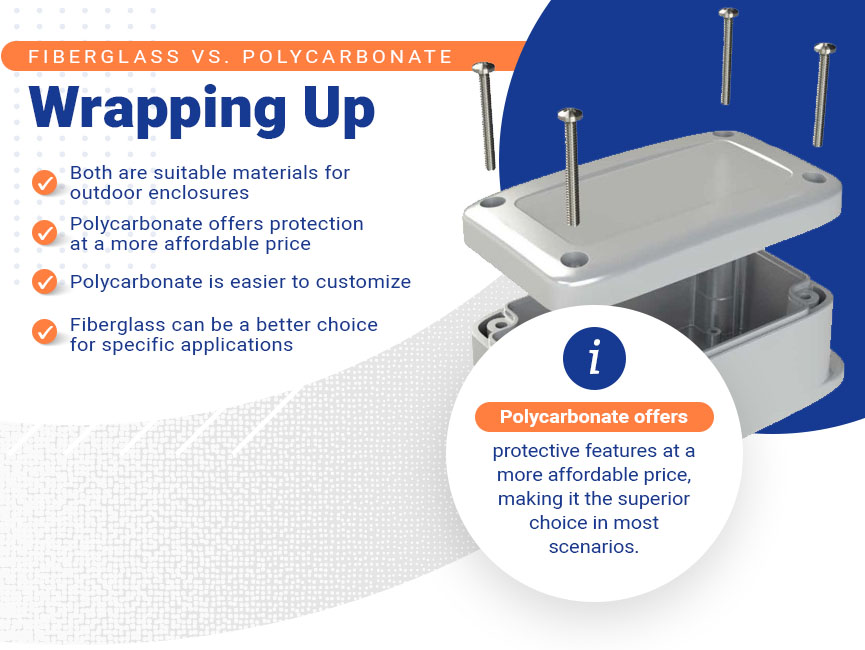
Deciding on a Fiberglass or Polycarbonate Enclosure
Let’s wrap up what we’ve learned about these two materials today:
- Polycarbonate and fiberglass enclosures have many similar characteristics and are both suitable materials for outdoor enclosures.
- Polycarbonate offers almost all of the most important protective features of fiberglass at a more affordable price, making it the superior choice in most scenarios.
- Polycarbonate is easier to customize and includes options such as clear front panels that may not be available on fiberglass enclosures.
- Fiberglass can be a better choice for a few specific applications, such as in environments where powerful organic solvents are frequently in use.
Next up, it’s time to explore some of Polycase’s best polycarbonate enclosure options — including some that are actually reinforced with fiberglass!
Polycarbonate Enclosures from Polycase
Polycarbonate enclosures are a core part of our offerings at Polycase. Our polycarbonate boxes are built for tough performance in all kinds of applications, and we’ve spent years developing an industry-leading lineup.
These are three of our top polycarbonate enclosure options:
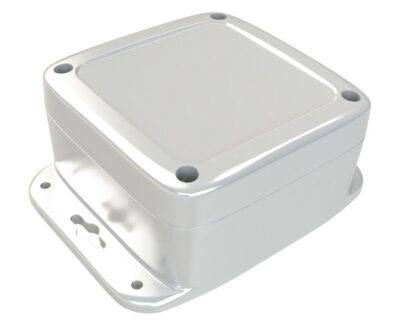
- Polycase HD Series: The HD Series models are some of Polycase’s most popular and cost-effective polycarbonate enclosures. Their NEMA 6P rating establishes them as some of the most protective enclosures available, and they’re available in a striking black color that’s uncommon in polycarbonate enclosures.
- Polycase ZH Series and ZQ Series: These two polycarbonate NEMA 6P enclosure series are some of our most advanced electrical enclosure solutions. The ZH Series is available with an optional hinged cover for easy access.
- Polycase ML Series: Our ML Series is another line of affordable and versatile NEMA 6P polycarbonate boxes. These enclosures are available with molded-on flanges to make surface mounting easy, as well as optional clear covers.
In addition, Polycase offers two models of fiberglass-reinforced polycarbonate enclosures:
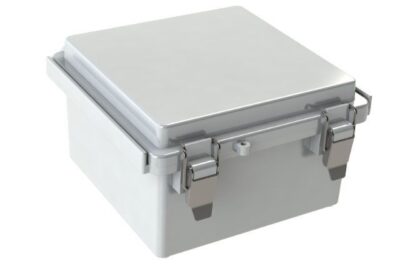
- Polycase WQ Series: In search of an option that combines the best features of fiberglass and polycarbonate? The Polycase WQ Series offers a full range of NEMA 4X enclosures featuring a base made from fiberglass-reinforced polycarbonate.
- Polycase SK Series: These fiberglass-reinforced polycarbonate enclosures are equipped with built-in knockouts for easy installation. With NEMA 4X rated ingress protection and IK08 impact resistance, the SK Series is a new level of convenience and performance.
Whether it’s polycarbonate, ABS or another material, we’re always happy to help you find the perfect enclosure solution. Call our enclosure experts at 1-800-248-1233 for personal assistance with your order — or get a quote now on your customized polycarbonate enclosures!
Image Credits
Flegere/Shutterstock.com
anna__aspid/Shutterstock.com
VITALII BORKOVSKYI/Shutterstock.com
PakulinSergei/Shutterstock.com
Shmizla/Shutterstock.com
0 Comment